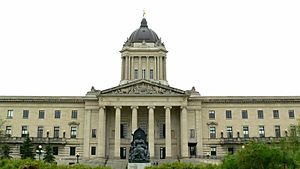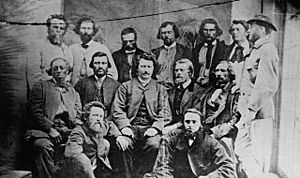Pascal Breland facts for kids
Pascal Breland was an important Métis leader, farmer, and politician in the 1800s. He lived before Canada became a country as we know it today. People often called him "le Roi des traiteurs," which means "The King of the Traders," because he was a very successful Métis trader. Pascal Breland held many important jobs, both elected and appointed. His work helped shape the identity of the Western Canadian provinces, especially Manitoba.
Contents
Early Life and Family
Pascal Breland was born on June 15, 1811. He was born in the Saskatchewan Valley, which is now part of Saskatchewan. His father, Pierre Berland dit Duboishu, was a French-Canadian fur trader and hunter. His mother, Marie Louise Josephe Bilideau, had both French and First Nations family roots.
In the late 1820s, Pascal and his family moved to St. François Xavier, Manitoba. On February 8, 1836, Pascal married Maria Grant. Maria was the daughter of Cuthbert Grant, another very important Métis leader. Pascal and Maria had a large family with fourteen children. Their eldest son, Patrice Breland, later followed in his father's footsteps in politics.
Pascal Breland passed away on October 24, 1896. He is buried next to his wife in the St. Francois Xavier Roman Catholic Cemetery.
Understanding Métis Identity
Pascal Breland was a proud Métis man. Being Métis was a big part of who he was and why he became a leader in Manitoba. Métis people have a unique culture that blends European and First Nations traditions. They were often skilled fur traders and hunters. This way of life helped them thrive in the plains economy before Canada was fully formed.
Pascal Breland became well-known through his farming. He also traded goods in the region, sometimes without the official permission of the Hudson's Bay Company, which had a monopoly on trade.
His marriage to Maria Grant showed the respect he had in his community. Her father, Cuthbert Grant, was a very influential Métis leader. Having a large family also helped strengthen his connections within the community. Beyond his family, Pascal Breland was known for his political work among the Métis. He held important roles in buffalo hunts, and some believe he became a captain of these hunts after Cuthbert Grant died.
Political Contributions
Pascal Breland was a key Métis figure during a time of big changes in the late 1800s. Because he was Cuthbert Grant's son-in-law and trusted by First Nations groups, he often acted as a messenger or negotiator. He helped in important political and legal discussions.
He supported Louis Riel Sr. during a protest in 1849. However, Pascal Breland was not present during the Red River Resistance of 1869-70. He also disagreed with Louis Riel's actions during that time. In 1851, Breland was appointed as a magistrate for White Horse Plains. This meant he helped keep law and order in the area.
Serving on the Council of Assiniboia
Pascal Breland became a member of the Council of Assiniboia in September 1857. This council was an important governing body in the Red River Settlement.
Joining the Manitoba Legislature
After Manitoba joined Canada in 1870, Pascal Breland ran in the very first general election. He won the election for the area of St. Francis Xavier East. He defeated John Bruce, who had been the president of the Métis provisional government in 1869. Breland won with 31 votes to Bruce's 18. He did not run for re-election when the Assembly ended in 1874.
During his time in the legislature, Breland played a big part in discussions and negotiations. These talks led to the signing of Treaty Number Four in 1874. This treaty was an agreement between the Canadian government and First Nations peoples.
Northwest Territories Politics
Pascal Breland served two long terms as a politician in the Legislative Assembly of the Northwest Territories. He was first appointed to the Temporary North-West Council on December 28, 1872. This appointment was made by Adams George Archibald, who was the first lieutenant-governor of Manitoba and the Northwest Territories. Breland served alongside another Métis leader, Pierre Delorme. He stayed on this council until it was dissolved in 1876.
Two years later, on July 10, 1878, he was appointed again to serve on the 1st Council of the Northwest Territories. He was the only member from the original council to be re-appointed. This happened because Métis people demanded to have a voice in the government. Breland was also the only member who lived outside the territories at that time. In total, he served 15 years as an appointed member of these councils.
See also
- Métis
- St. François Xavier, Manitoba
- Council of Assiniboia
- Manitoba Legislative Assembly
- Temporary North-West Council
- Red River Resistance
 | May Edward Chinn |
 | Rebecca Cole |
 | Alexa Canady |
 | Dorothy Lavinia Brown |



